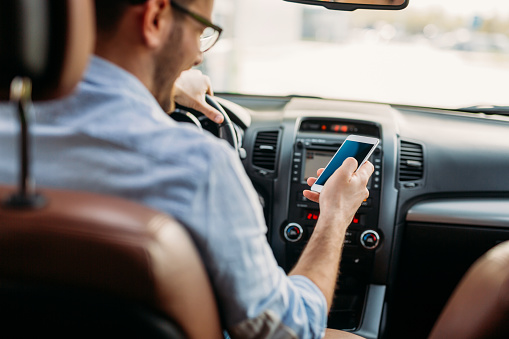Have you ever blared on your horn as a driver veered into your lane with their cell phone in hand? Or maybe you’ve been the guilty party?
Everyone knows that texting while driving is dangerous. It has been illegal in our state since 2013. But a new Florida law changes how drivers are allowed to use their cell phones and strengthens the texting while driving ban. The first part of this law went into effect July 1, and the second part of the law goes into effect October 1, 2019.
What does this law mean for Florida drivers?
Texting While Driving Becomes a Primary Offense
Texting while driving was considered a secondary offense in Florida. Officers could only issue a citation if they pulled drivers over for another reason, such as speeding or swerving.
As of July 1, 2019, Florida became the 45th state to make texting while driving a primary offense in Florida. This means officers can pull drivers over just for texting and driving, without any other traffic violation.
No Hand-Held Phones in School and Work Zones
As of October 1, 2019, Florida drivers will not be allowed to hold cell phones in their hands in work or school zones. Drivers in these zones shouldn’t hold the phone up to their ear, type anything on their screen, or even hold their phone to read their GPS. If a law enforcement sees a driver breaking this new law, they may issue a citation. The work zone must be an “active” work zone, meaning for the law to apply, workers must be present.
What About Hands-Free Calls?
Florida drivers can still talk on their phones in an active work or school zone, but they must use a
hands-free device. Earbuds may only be used in one ear.
What About GPS?
You can still use your phone for GPS at any point, as long as you’re not typing or holding your phone in your hand while driving.
How Florida’s New Texting While Driving Law Will Be Enforced
The new texting and zoning law includes a warning period until January 1, 2020. You may be issued a warning rather than a ticket if you are pulled over for breaking the new law before then. You can fight a ticket issued during this warning period by purchasing a hands-free device and showing the judge your receipt.
After January 1, the first violation of the new rule results in a $30 fine. It doesn’t go on your driving record, so you don’t get points against your license. However, the second violation within a five year period is considered a moving violation. The fine increases to between $60-100, and you get three points against your license. This is the same amount of points you would get for driving up to 15 miles over the speed limit. Points stay on your Florida license for three years.
Officers must actually see you texting while driving, unless you give them permission to check your phone. They cannot check your phone without your permission unless they have a search warrant.
When Is Texting In Your Vehicle Allowed?
You can legally text when you are waiting at a red light. Drivers of emergency vehicles or drivers reporting a crime are exempt from the new law.
Texting While Driving May Make Your Insurance Go Up
AAA studies show that drivers who text and drive are eight times more likely to be involved in a crash. In 2016, about 51,000 Florida crashes were attributed to distracted driving. Some of these crashes involved fatalities.
Drivers who text are drivers who take risks. Insurance companies know this. Getting a ticket may be expensive, but the biggest financial consequence of breaking the new law may be an increase in car insurance premiums.
What If You’re Hit By a Distracted Driver?
If a distracted driver hits your car, their insurance should cover your loss. But what if the distracted driver doesn’t have insurance? Someone who breaks one law, may break another! Make sure you have an auto insurance policy that will cover your loss in the event of a collision with an uninsured motorist. Talk to a local Farm Bureau agent today.

